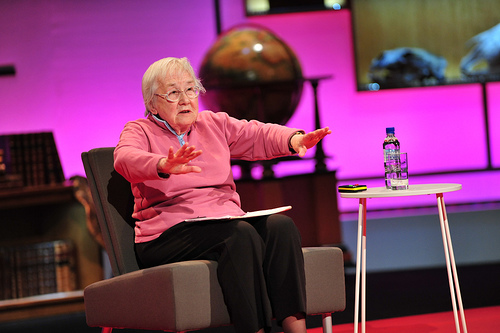
Why is the human phenotype so different from the chimpanzee, even though experts constantly point out how similar the genotypes are? Why are we bipedal while they walk on four legs? Why are we hairless while they are hairy? Elaine Morgan seeks to look beyond what she thinks are the utterly incorrect answers proposed by evolutionary biologists. If we’re so different than the other higher primates, something must have happened to make us so. So: what happened?
Morgan is intrigued by evidence that shows that savannah habitats — long thought to be a driving force behind the way humans evolved — didn’t exist at the time when the adaptations happened. This indicated that a paradigm was about to radically change. She says, What do scientists do when paradigms fail? They continue working on the paradigm as though nothing happened!
But finally a new paradigm was about to emerge. In the ’60s, a scientist wondered whether human evolution was shaped by a more “aquatic” lifestyle. But the idea was ridiculed by scientists for years — although now the theory is beginning to enjoy some favor. There is a set of questions that, in particular, throw doubt on the conventional story of human evolution:
Why are we hairless? The other mammals that are hairless are mostly aquatic — dolphins, whales. But what about elephants?, we might ask. Morgan says it’s been discovered that elephant ancestors were aquatic. While not all aquatic mammals are naked, like seals, all animals that are naked have so far been discovered to have had aquatic ancestors.
Why are we bipedal? There is only one situation in the mammalian world where mammals walk around on two legs: when they are in water.
Why do we have the layer of fat under our skins, unlike other primates? Aquatic mammals include a layer of fat, and a layer of skin. Humans can become obese in a way that is physically impossible for other primates.
Why can we control our breath? The only animals with conscious control of the breath are animals that spend time in water.
Why do we have streamlined bodies? Perhaps, Morgan suggests, to optimize us for mobility in water.
Morgan has struggled her whole life to show that perhaps the prevailing theory of human origins is wrong. After all, she says, history is riddled with instances where theories proved to be wrong. She says Dan Dennett, David Attenborough and other prominent scientists and thinkers have come to agree that the aquatic ape theory is important. To laughter and applause, she encourages TED to “come on in, the water’s fine.”
Morgan looks forward to a new point in science where conventional ideas about human evolution can be synthesized with the aquatic ape theory — but, for now, the “rival” theories live apart.
Photo: Elaine Morgan at TEDGlobal 2009, Session 6: “Curious and curiouser,” July 22, 2009, in Oxford, UK. Credit: TED / James Duncan Davidson
Comments (8)